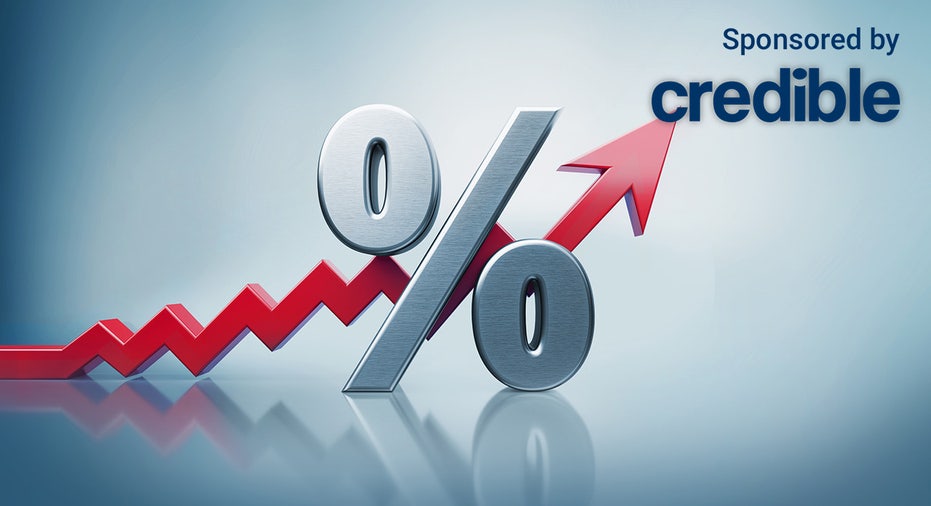Mortgage rates increase to highest rate since November 2008
The 30-year mortgage rate has risen two percentage points this year

Mortgage rates surged once again last week, edging closer to the 6% mark and hitting the highest rate since 2008, according to Freddie Mac data. (iStock)
Mortgage rates increased once again last week, edging closer to the 6% mark and hitting their highest point since November 2008, according to new data from Freddie Mac.
The average 30-year fixed-rate mortgage increased to 5.81% for the week ending June 23, according to Freddie Mac’s Primary Mortgage Market Survey. This is up from the week prior when it averaged 5.78%, and up from 3.02% last year.
"Fixed mortgage rates have increased by more than two full percentage points since the beginning of the year," Freddie Mac Chief Economist Sam Khater said. "The combination of rising rates and high home prices is the likely driver of recent declines in existing home sales. However, in reality, many potential homebuyers are still interested in purchasing a home, keeping the market competitive but leveling off the last two years of red-hot activity."
The average 15-year mortgage rate also rose to 4.92%, according to Freddie Mac. This is up from 4.81% last week and 2.34% last year. Additionally, the five-year Treasury-indexed hybrid adjustable-rate mortgage (ARM) increased to 4.41%, up from 4.33% last week and 2.53% last year.
If you are looking to purchase a home or refinance your current loan, comparing multiple lenders can help you get the best rate. Visit Credible to find your personalized interest rate without affecting your credit score.
HOME PRICE GROWTH HIT AN ALL-TIME HIGH IN MARCH: THIS IS HOW HOMEOWNERS CAN CASH IN
Interest rates likely to continue rising
As mortgage rates continue to rise, more interest rate hikes could still be on the way amid the Federal Reserve's continued fight against inflation.
"The Freddie Mac fixed rate for a 30-year doubled-down on last week’s 55 basis point jump, rising three basis points to 5.81%, the highest level since November 2008, during the Great Financial Crisis," George Ratiu, Realtor.com's manager of economic research, said. "Rates diverged from the slide in the 10-year Treasury, even as investors moved toward safer assets on heightened recession worries, following Federal Reserve Chairman Powell’s congressional testimony in which he highlighted that the central bank’s rate hikes could lead to an economic downturn.
"The Fed seems fully committed to reining in the pace of runaway inflation, which has been leaving Americans with fewer dollars in their pockets month after month," Ratiu continued. "With gasoline prices around $5 per gallon, daycare costs up by double-digits and food expenses rising, consumers are cutting back on retail spending. With pressures to return to offices mounting, discretionary spending is likely to see further pullback in the months ahead."
At its June meeting, the Federal Reserve raised interest rates by 75 basis points, the highest rate hike since 1994. Prior to that, the Federal Reserve raised interest rates by 50 basis points in May and by 25 points in March. And more rate hikes are expected this year and into 2023 as the Fed combats decades-high inflation.
If you want to take advantage of interest rates before they rise further, you could consider refinancing your mortgage. Visit Credible to compare multiple mortgage lenders at once and choose the one with the best interest rate for you.
DESKTOP APPRAISALS USHER IN NEW ERA FOR MORTGAGES, SPEEDING UP & SIMPLIFYING THE PROCESS
Mortgage payments surge from last year
As mortgage rates and home prices rise, the cost of buying a home has increased significantly since last year.
"Mounting financial pressures are compounding the ongoing affordability crisis in real estate markets." Ratiu said. "Rents and home prices continue to rise at double-digit rates. For buyers of a median-priced home, the one-two punch of record-high prices and rising interest rates has pushed the monthly mortgage payment to about 64% more than last year, tacking on over $800 to the cost of financing."
But this rise in costs is also helping cool the pace of the housing market and home price growth.
"Market prices will continue adjusting to a smaller pool of qualified buyers and higher financing costs," Ratiu said. "The move from an overheated real estate market toward a more sustainable one will take some time. The upside is that eventually, we should see a healthier environment with more options and better value for many buyers."
If you are looking to buy a home or refinance your current mortgage loan, using an online marketplace like Credible can help you compare lenders and save money. If you have any questions, you can also contact Credible to speak to a home loan expert.
Have a finance-related question, but don't know who to ask? Email The Credible Money Expert at moneyexpert@credible.com and your question might be answered by Credible in our Money Expert column.




















